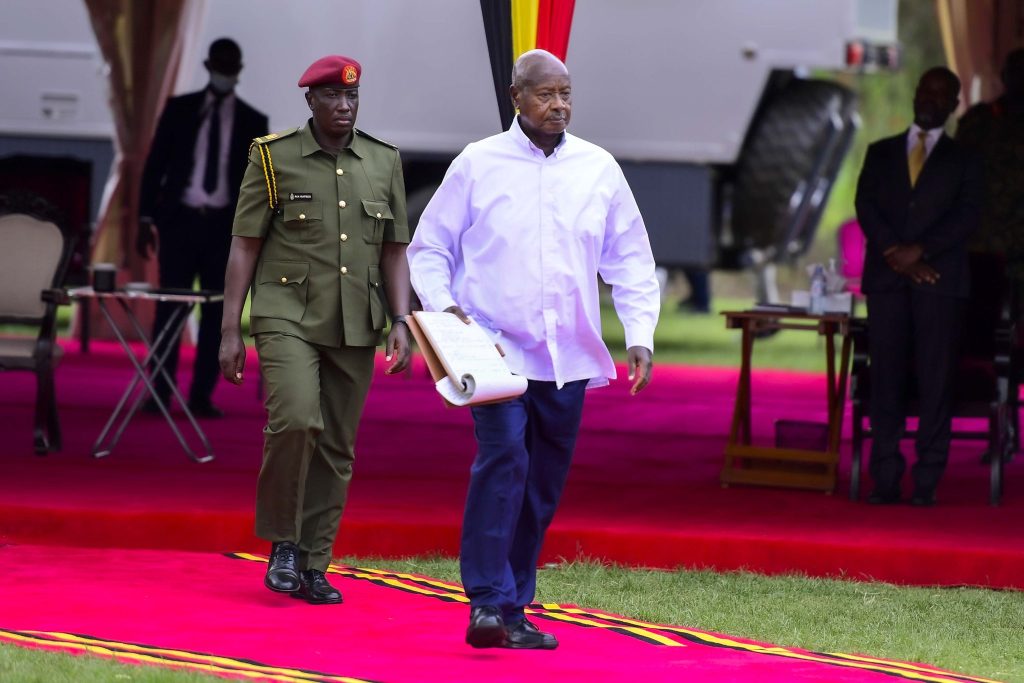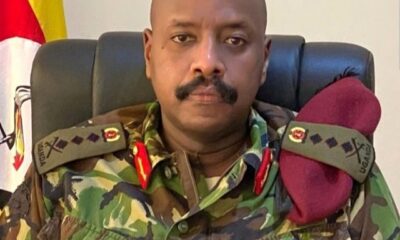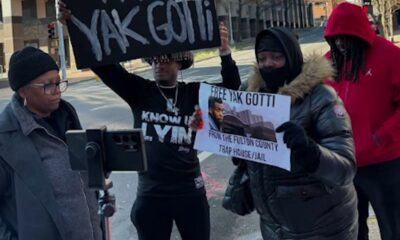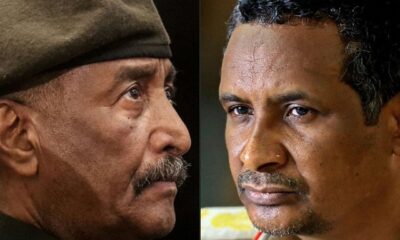
OWEYEGHA-AFUNADUULA: Labour Day Not Worth Cerebrating In Uganda Without Minimum Wage
By Oweyegha-Afunaduula
All governments of the word need to take the intent and purpose of the globally celebrated Labour Day seriously if they care about the labouring people in their countries. They should not just emphasize employment, jobs, money and investments in things instead of people.
Labour Day is not about these but social justice and labour justice for workers. Economies are healthy if societies and the people therein are healthy. It is the centrality of people in an economy that matter.
Indeed, the most important investment in any economy is investment in the people, especially socially. Most important, governments must invest heavily in building social justice and labour justice, which is an aspect of social justice. The two are critical issues in the civilisation of our present generation and future generations.
Civilization is not about things or science but people, especially in terms their social development. Therefore, it is a waste of time to organize Labour Day celebrations only to talk about issues unrelated to social development, social justice and, for that matter, labour justice Critical to Labour Day is the issue of Minimum Wage for workers, an element in labour justice.TrendingJUST IN: Bobi Wine Breaks Silence As Nandala Mafabi Drags NUP Into FDC Chaos
It can be a tool for combating the rising evil of domestic slavery, especially in Uganda and minimizing crude exploitation of the people by the rich, private and public actors in the economy such as government.
Therefore, whoever preached development, transformation and progress in the 21st century will be civilized and a civilizing agent if he or she puts Minimum Wage for workers first and everything else next.
If not, then she or he will cast herself or himself as anti-God, anti-people and a roadblock social development, transformation and progress in and of the country. Talk about development, transformation and progress will be just empty talk and a time waster.
Minimum wage for workers translates into correct investment socially in the people and society. It is wise investment towards a healthy population, healthy society and healthy future of a country with multiple healthy futures of families and people therein. There will be social justice for all and labour justice for workers.
If Minimum Wage is ignored by a government, it translates into neglect of the health of a nation in terms of economy since the government ignores the central factor of an economy: people. Such neglect is the pathway of creating a country of masters and slaves; a country of rich and poor/needy.
It is a mustard seed for violence well in future. History shows that the poor exploited masses have always risen against the poor and the rich, thereby liberating themselves from slavery and exploitation.
This has often resulted into enormous destruction of what the masters and the rich have build for themselves, their children and children’s children. Where there is no social justice and labour justice there is always socio-economically looming violence.
In this article I take it that Minimum Wage is a tool of social justice and labour justice and that resistance to it entails the ulterior motive of perpetual domination, exploitation and slavery in the false and ill-advised belief that it is easier to rule people who are poor and needy than those who have and are rich.
I see such strategy of leadership as governance as arrogant, politically corrupt and a reflection of total disrespect for the citizens of Uganda. It converts the citizens of Uganda into nothing but beasts of burden for others, principally foreigners.
My belief then is that it is not worth anymore celebrating the global Labour Day in Uganda without any commitment to Minimum Wage. Continuing to celebrate Labour Day without commitment to Minimum Wage is misleading, diversionary and politically empty.
Meaningful politics of a country should put people first and everything else next. However, we know that this will never be so long as President Tibuhaburwa Museveni continues to be at the helm of leadership and governance of Uganda, and if he manipulatively passes the reigns of power to his son, General Muhoozi Kainerugaba.
President Tibuhaburwa Museveni’s philosophy of development is that infrastructural development should come first and social development last. To him a socially developed people is not critical to development. Indeed, he has shown in speech and practice that what matters are money, infrastructure, manufactures and cheap labour.
In his thinking, decisions and actions, he is recreating Uganda as a cheap labour reserve just as what the British colonialists wanted it to be. This explains why it is during his rule that the slave route from Uganda to the Middle East has been rediscovered and domestic recovery has become one of the major achievements of his politicomilitary regime
I take May 1 Labour Day as an opportunity to undertake comparative assessment of the progress humanity has made in different countries towards entrenching and proliferating social justice and labour justice over the decades, and what steps Governments are taking to make social justice and labour justice the joint hallmark of a working society. Indeed, Minimum Wage should be a measure the qualitative change in human civilisation globally and in different countries.
Also known as May Day, May 1 is celebrated to honour the working class and commemorate their struggles for fair wages and salaries and better conditions. On the occasion, the International Labour Organisation (ILO) emphasizes the importance of the governments and the private sector renewing commitment to social justice and labour justice in the world of work.
This year, 2024, like in the previous years, ILO has highlighted the daily challenges, both existing and emerging, that workers face, and called for action to ensure that economic growth translates into better living standards and working conditions for all. ILO stated:
“This year, our celebration of Labour Day has a sense of urgency for renewed commitment to social justice, as we navigate through the complexities of our time, including climate change and the rapid evolution of the workplace due to technological advancements. These challenges have not only tested our resilience but have also underscored the indispensability of concerted efforts and solidarity in promoting the welfare of workers across all sectors,”
To begin with, all people conscious of the suffering of our labouring, heavily taxed people need to understand the history of the Labour Day and why it has been celebrated for centuries and why it continues to be celebrated worldwide towards the 22nd Century.
The origins of May Day can be traced back to the late 19th century, specifically to the 1886 Haymarket Massacre in Chicago, USA. At the time, several countries were reeling under the heat of industrialisation. Crop failure in the 1840s had led to widespread anti-feudal upheavals collectively called ‘The Revolutions of 1848,’ with Karl Marx’s The Communist Manifesto leaving a lasting impact on workers.
The subsequent events resulted in the birth of an umbrella body for socialists and communist organisations in 1864, known as the First International. Thousands of blue-collar workers in the industrial city of Chicago in the United States went on a massive strike to demand better working conditions and a reduction in their work hours from 12-15 hours a day to eight hours daily.
The movement spread throughout the country, rallying tens of thousands of workers. On May 4, 1886, a bomb went off at a protest rally at the Haymarket Square in Chicago and ended in a riot as workers clashed with police. At least 11 people were killed. The incident, which came to be known as the Haymarket massacre, is referred to as the origin of May 1 being celebrated as Workers’ Day.
The Second International that emerged in 1889 declared May 1 as International Workers’ Day to commemorate the struggle for labour rights and as a tribute to those killed in Chicago.
“No single event has influenced the history of labour in Illinois, the United States, and even the world, more than the Chicago Haymarket Affair. It began with a rally on May 4, 1886, but the consequences are still being felt today. Although the rally is included in American history textbooks, very few present the event accurately or point out its significance,” William J. Adelman, a scholar of labour studies noted about the Haymarket Affair.
Labour Day has been a public holiday in Uganda as long as I can remember, or as long as I have understood that there are people called workers. Even when I was a young boy in the 1950s during British colonial occupation of Uganda, Labour Day was being celebrated in Ikumbya Primary School where I was growing up physically and brainwise.
It was, and continues to be, a day off for the general population. Schools, universities, technical institutions and most businesses are closed. It is hospitals that are not closed.
Unfortunately, Labor Day is often used as a day to defend workers rights However, in Uganda, for the last 38 or so years, it has been a day that the ruling Party, National Resistance Movement (NRM) uses to make political speeches to highlight what it has achieved, and what it will achieve, if it continues in power.
NRM also uses the day to give medals to some people who have helped the regime to hold onto power since 1986. Little is talked about workers and their deplorable working environment and/or conditions, let alone the now entrenched domestic and external modern slavery, which has consumated the country’s young people, and which government boasts of being a conduit for foreign money from Ugandans working abroad.
Clearly social justice and labour justice do not mean anything worthwhile to NRM and its leaders. In fact, the regime government has allowed foreigners from neighbouring countries and from such countries as India, China and Pakistan to do the kind of business that local Ugandans can do.
Such foreigners are acting as venders and are frequently exempted from taxation. This of course is social and economic injustice and calls into question the rulers’ commitment to patriotism, nationalism, citizenship, sovereignty and independence of Uganda.
It means that consciously or unconsciously, our people are being excluded from meaningful participation in the economy of Uganda. The question is: What is the future Ugandans and Ugandan workers in the current economic and political dispensation preferred by our rulers.
As if that is also worrying is that the NRM regime does not tolerate demonstrations by workers of all types who take it as an inalienable right to struggle for social justice and labour justice.
Besides, there is widespread abuse of workers in terms of promotions, emoluments, and prices for their produce. Those who do not really labour, but simply consume, are the ones the government cares about more. Many in particular categories of jobs have their salaries determined from elsewhere rather than the Uganda Public Service Commission.
Consequently, many state functionaries who do not contribute to the productivity of the economy are the ones who get big salaries, big pensions, big allowances and big vehicles, and are assured of comfortable life after retirement. These include politicians, soldiers and leaders of state enterprises
Sadly, this is exacerbated by ethnicization of the country’s politics, economics and labour, indicating that those who get employed by government, and whose employment in the private sector is influenced by the government, tend to belong to one ethnic group, which has dominated power since 1986.
This explains why during the weekend, and even before, many more state-of-the-art vehicles move to Western than to Eastern and Northern Uganda. It also explains why most pupils and students in expensive schools and universities are from Western Uganda. It also explains why the people that can afford medication in expensive hospitals are also from Western Uganda.
The implication is that the country’s resources are concentrated in a few hands in Western Uganda. This thus means that Uganda today is socially and economically segregated in the fashion of orthodox apartheid in the defunct. Besides politically one ethnic group now dominated the politics of the country.
It will not be surprising if the ethnic group starts imposing people from amongst it to represent the people in the other regions of the country in Councils and the Parliament of Uganda. This will be reminiscent of the period of British colonial rule when virtually all the members of the Legislative Council, District Commissioners, Provincial Commissioners, Army Commanders, Lecturers, Professors, secondary school teachers, some primary school teachers, agricultural officers, veterinary officers, forest officers and fisheries officers were British nationals. It wil be like a new imperialism.
Those days, May 1 Celebrations were dominated by British nationals in Uganda, who were in charge of the country politically, economically and socially. We may say there was political, economic and social discrimination in Uganda under British rule, but eventually the colonisers allowed Africans to enter politics, economics and sociality and eventually take over. It is not certain that under current black imperialism a reversal in political, economic and social domination and control will be realised soon.
So, currently, there is so much social and labour injustice. Despite the social and labour injustice that reigns in Uganda, the theme of the 2024 May 1 Labour Day was “Improving access to labour justice for increased productivity”. The theme of 2023 May 1 Labour Day Celebrations was “Promoting Positive Work, Culture and Ethics: A Perspective for Increased Investment, Employment Opportunities and Household Incomes”.
However, celebrations over the years have been undermined by President Tibuhaburwa Museveni’s rejection of the Minimum Wage Bill 2015, which Parliament passed in February 2019 because, according to him, the issues the Bill wanted to address were already addressed by the Minimum Wages Advisory Boards and Wages Councils Act of October 1957 enacted five years before the independence of Uganda on 9th October 1962.
If he had not rejected the Bill, its passage into law would have greatly enhanced social and labour justice in Uganda and discouraged the sprouting of slave labour in the country simultaneously with rise in external slavery especially in the Middle East. Many Ugandans working abroad would have come back to develop their country. They would be attracted by social and labour justice
There is no doubt that the struggle for minimum wage is the greatest demonstration of the continuous struggle social justice, labour justice and human dignity. Indeed, as Harold Acemah observed in his article “Workers of Uganda Unite” published in the Daily Monitor of April 30 2023, the 2008 International Labour Organization’s (ILO’s) Declaration on Social Justice reiterated the importance of minimum living wage to all employed and in need of such protection.
Indeed, most members of ILO have enacted laws to provide for Minimum Wage. All the other member states of the East African Community have laws providing for minimum wage. But President Tibuhaburwa continues to resist the right to Minimum Wage while gracing every labour day with his speeches and giving out medals to those who have served his regime in various capacities.
His reasoning has always been that if there is no minimum wage Uganga will be awash with foreign investment. Instead, the country is awash with slavery. Thus, the President continues to protect the rights of foreign interests rather than those of the citizens for social justice in general and labour justice in particular.
This way, President Tibuhaburwa Museveni personally perennially and consistently violated Article 40 of the Constitution of the Republic of Uganda, 1995, which provides for economic rights. The article seeks to protect labour rights in Uganda. In Particular, Clause (1) (a) provides for the right of persons to work under satisfactory, safe and healthy conditions, which include a minimum wage.
This is the social mission of the Uganda Constitution 1995, which the President undermines by rejecting the Minimum Wage. Besides, by his choice of lip service to the workers of Uganda, the government is diluting many other legal instruments that constitute the regulatory framework, which applies to labour relations and serve the interests of Ugandan workers, namely:
The 1995 Constitution of the Republic of Uganda
The Employment Act, No. 6 of 2006,
The Labour Unions Act No. 7 of 2006
The Labour Disputes (Arbitrations and Settlement) Act No. 8 of 2006 which provides for the resolution of Labour disputes
The Occupational and Safety and Health Act replacing The Factories Act and providing for working conditions at work place
The Workers’ Compensation Act which regulates compensation to workers for diseases and injuries sustained in the course of employment
The National Social Security Fund Act, that obliges employers to deduct 5% of an employee’s salary and make a 10% contribution towards the Employee’s savings with NSSF
The Pensions Act that provides for Pension of civil servants,
The Local Governments Act that provides for Pension of civil servants
The Public Service standing Orders,
Whistle Blowers Protection Act, 2010
The Minimum Wages Advisory Board and Wages Council Act, 1957
Common Law and the doctrines of equity by virtue of Section 14 of the Judicature Act
The current labour regime in Uganda is, no doubt, based on the Uganda Constitution 1995, Acts of Parliament, Case Law, International Conventions, and other related policies and programmes. However, many organisations find themselves at cross roads in implementing the law as per its’ dictates. They devise policies and procedures which at times are not in tandem with the prevailing law.
During the State-organised 2024 Labour Day celebrations at St Leos College Kyegobe playgrounds in Fort Portal City, President Museveni dis not mention social justice or labour Justice, which ILO expected all government to dwell on, although the theme of the occasion, as mentioned above was “Improving Access to Labour Justice: A Prerequisite for Increased Productivity”.
Instead, he gave out 58 medals to people considered to have rendered distinguished service to the country. The occasion was also used as an opportunity to show off military power. As if the occasion was an assessment of to what extent government had succeeded in creating jobs in the country, the President said “Uganda’s problem is not lack of jobs but rather a poor attitude towards work”.
He did not relate the poor attitude to work to the injustices in wages and salaries, with a few people being excessively remunerated while those they share qualifications and experience get meteorically far less. The occasion was also used by some in the regime to highlight that a Minimum Wage would discourage investment, which was a way of telling Ugandans that President Museveni is right to reject Minimum Wage.
Of course, they did not see any relationship between the mushrooming domestic slavery and external slavery supersonically rising and the rejection of Minimum Wage. Working people unable to make ends meet in their families are encouraging their children to become slaves in the Middle East to improve family income and meet various duties, responsibilities and obligation. Apparently, most of the firms streaming young people off into modern slavery are state or regime functionaries.
It is encouraging that on 24 May 2023 the Parliament of Uganda, chaired by Deputy Speaker Thomas Tayebwa, passed the Employment Amendment Bill 2022.that will see casual labourers who have served for six continuous months deemed to have a valid contract. Legislators, however, rejected the proposal that would have seen maternity leave increased from 60 to 90 days.
The drafters of the bill had proposed that if one hires a casual laborer for continuous 6 months, the employer should enter into contract with the casual worker if he so wishes to redeploy him or her, and should provide employment benefits. This, according to workers’ representatives was devised to protect casual workers who they said are manipulated by employers, paying them less than the agreed upon wages.
“We have been fighting casualization to the level of International Labour Organization; shall we fold our arms when our people are being mistreated? We are saying that if somebody has worked for you for six months and you still need him or her, employ them,” said Workers Representative, Hon. Charles Bakkabulindi.
Workers Member of Parliament, Hon. Margaret Rwabushaija, said that factories are now using third parties to hire casual labourers which she said leads to exploitation. She added that casual labour is also prevalent among health workers and teachers saying that this calls for a legislation to protect their rights.
The then Minister of State for Industry, Hon. David Bahati, said that the proposal to restrain one from employing a casual laborer for more than six months, will cause challenges in implementation.
“This will push away some investment in terms of prediction that it will be costly,” Bahati said. In other words, the minister was more concerned with foreigners investing to make money for themselves than improving social and labour justice for casual labourers.
This was reminiscent of President Tibuhaburwa Museveni’s rejection of Minimum Wage for the same reason: investors! Apparently, government allows investors to take all the money they make out of the country, and also gives them tax holidays of ten years. Besides, the investors have numerous ways of evading paying taxes.
The Minister for Gender Labour and Social Development, Hon. Betty Amongi, said employers were flouting the provision in the labour regulations, which require them to offer contracts to casual workers after four months of employment. “Employers have been failing to comply and many workers have run to the Constitutional Court. The ruling of the court has been that this provision is inferior, that it is not provided under any law,” she said.
Parliament also vetoed the provision to grant a mother who has given birth to more than one child, 90 days of maternity. This was discriminatory against working mothers.
In conclusion let me ask:
Does a Ugandan worker matter in any significant way in the current economy of Uganda heavily dependent on foreigners?
Why had President Tibuhaburwa Museveni’s politicomilitary regime allowed domestic slavery and external slavery to mushroom?
3 Is May 1 Labour Day still worth celebrating in uganda anymore without minimum wage?
Which Way Uganda?
For God and My Country
OWEYEGHA-AFUNADUULA: Labour Day Not Worth Cerebrating In Uganda Without Minimum Wage
News
Gen. Muhoozi’s Provocative Rhetoric Undermine Uganda’s Diplomatic Future with Regional Partners.

By Amiri Wabusimba.
In recent years, Gen. Muhoozi Kainerugaba, the first son and Chief of Defense Forces (CDF), has gained notoriety for a series of provocative remarks posted on his X (formerly Twitter) account. These tweets, often laced with humor, have sparked controversy and made headlines for their alarming content, including claims of capturing neighboring cities such as Nairobi in Kenya within 24 hours. More recently, his rhetoric has extended to threats against South Sudan, raising significant concerns about Uganda’s diplomatic future and its role on the global stage.
Uganda, as a UN member state, is bound by the Vienna Convention on Diplomatic Relations, which upholds the sovereignty of all nations and prohibits threats or acts of aggression. Despite the informal nature of Gen. Muhoozi’s remarks, they undermine these principles, jeopardizing Uganda’s relations with neighboring countries. Such statements, even when presented in jest, have the potential to destabilize diplomatic ties and provoke unnecessary tensions, especially if left unaddressed.
Gen. Muhoozi’s tweets may not constitute formal declarations of war, but they breach several international laws and Uganda’s own Constitution. The United Nations Charter Article 2(4), prohibits threats or the use of force against the territorial integrity or political independence of any state. Article 3 of Uganda’s 1995 Constitution obliges government to safeguard the nation’s independence and territorial integrity while respecting other states sovereignty. His comments suggest military action against neighboring countries, which directly contravenes these constitutional and international obligations. Persistent threats against neighboring countries could trigger a diplomatic crisis, eroding trust and damaging Uganda’s ability to foster strong relationships regionally and internationally.
Diplomatic engagement relies on mutual respect, adherence to norms, and a commitment to peaceful coexistence. Gen. Muhoozi’s rhetoric creates an image of Uganda as a volatile and unpredictable state, deterring potential investors and straining international cooperation. Recently, the United States issued a warning after one of Gen. Muhoozi’s tweets targeted the U.S. Embassy in Uganda. Although the tweet was later deleted, the damage to Uganda’s reputation was already done. This incident exemplifies the dangers of public officials using social media irresponsibly. Strained relations, sanctions, or even diplomatic expulsions could result from such behavior.
In 2019, Philippine President Rodrigo Duterte made public threats against Canada over a waste disposal dispute. Although his remarks were intended to pressure Canada diplomatically, they were widely perceived as undermining international norms and relations. While the conflict did not escalate militarily, it created a diplomatic rift and tarnished the Philippines’ global reputation. A parallel can be drawn with Gen. Muhoozi’s provocative tweets, which risk creating a lasting diplomatic fallout and damaging Uganda’s standing with its neighbors and broader international community. The global landscape increasingly demands adherence to international law and peaceful conflict resolution.
Reckless rhetoric not only isolates nations from international forums, trade opportunities, and collaborative ventures but also fosters a perception of unpredictability among officials, which can lead to severe economic and political consequences. To safeguard Uganda’s future, diplomatic dialogue with neighboring countries should be urgently initiated to clarify Uganda’s stance and prevent misunderstandings. Gen. Muhoozi’s aggression rhetoric contravene international laws, breach Uganda’s Constitution, and threaten the country’s diplomatic standing. Government must prioritize peaceful diplomacy and respect for sovereignty as outlined in the Vienna Convention and Uganda’s Constitution. By addressing these issues decisively, Uganda can secure a stable and prosperous future on the global stage.
Author is a diplomatic Scholar, Journalist, political analyst and Human Right activist
Tel: +56775103895 email: [email protected]
Gen. Muhoozi’s Provocative Rhetoric Undermine Uganda’s Diplomatic Future with Regional Partners.
News
NUP Condemns Attack on Headquarters by NRM Funded Alien Skin and Gang

The National Unity Platform (NUP) has condemned an alleged attack on its headquarters in Kavule, Makerere, reportedly orchestrated by controversial singer Alien Skin and his associates. According to a statement released by the party, the incident occurred in the early hours of the morning at approximately 3:15 a.m.
The statement alleges that Alien Skin’s group unlawfully entered the party’s premises, threatened the security guard on duty, and vandalized the walls with provocative graffiti. NUP expressed deep regret over these actions, describing them as reminiscent of tactics used by individuals deployed in the past to destabilize efforts for political reform in Uganda.
“It is regrettable that these brothers have learned nothing from those who the regime and other detractors have used against the people in the past, including Sipapa, Sobi, Zebra, Kitatta, among others,” the statement read.
The party noted that such incidents tend to spike as Uganda approaches elections, suggesting that certain groups are allegedly being used to derail the opposition’s agenda through acts of provocation and violence.
NUP urged Alien Skin and his associates to reflect on their actions, warning that history has repeatedly shown how individuals used to disrupt political struggles often face repercussions and lose public favor over time.
“The struggle for a better Uganda cannot be derailed by such antics. We call upon all Ugandans to remain vigilant and united in the face of intimidation and provocation,” the statement concluded.
This attack has sparked widespread condemnation from opposition supporters and human rights activists, who see it as part of a broader campaign to stifle dissent in the lead-up to elections. Meanwhile, calls for accountability and an impartial investigation into the incident are growing louder.
Alien Skin has yet to comment on the allegations, and efforts to reach him for a statement were unsuccessful at the time of publication.
NUP STATEMENT
This morning at 3:15am, a team led by musician Alien Skin attacked the National Unity Platform Headquarters at Kavule. They violated the premises, threatened the security guard on duty and used graffiti to draw provocative things on our walls. It is regrettable that these brothers have learnt nothing from those who the regime and other detractors have used against the people in the past, including Sipapa, Sobi, Zebra, Kitatta, among others. It is sad that each time we’re approaching elections, there is always a group willing to be used to engage in crimes against the people. We hope they will do some introspection before time catches up with them.
NUP Condemns Attack on Headquarters by NRM Funded Alien Skin and Gang
News
NUP : Museveni Apologist Alien Skin and Gang Target Uganda’s Main Opposition Party Head Officers

The National Unity Platform (NUP) has accused popular musician Alien Skin of leading an attack on its headquarters in Kavule early Saturday morning.
“This morning at 3:15 a.m., a team led by musician Alien Skin attacked the National Unity Platform Headquarters at Kavule. They violated the premises, threatened the security guard on duty, and used graffiti to draw provocative things on our walls,” read the statement issued by NUP.
NUP released a cctv video footage showing Alien Skin’s gang emerging from three cars to attack the party’s offices.
The party condemned the attack, describing it as a recurring tactic used by detractors to destabilize opposition activities, particularly during election periods.
Drawing parallels to controversial figures associated with past political violence, NUP stated:
“It is regrettable that these brothers have learnt nothing from those who the regime and other detractors have used against the people in the past, including Sipapa, Sobi, Zebra, Kitatta, among others. It is sad that each time we’re approaching elections, there is always a group willing to be used to engage in crimes against the people. We hope they will do some introspection before time catches up with them.”
Incidents
The alleged vandalism comes just weeks after Alien Skin and his entourage were accused of storming Nsambya Hospital.
In that incident, hospital operations were disrupted, and staff reportedly faced threats and intimidation, sparking widespread condemnation.
Alien Skin was jailed over the violence meted out against doctors at the hospital before being released on bail.
Alien Skin, once celebrated for his contribution to Uganda’s music industry, has increasingly been linked to politically motivated aggression.
While Alien Skin has not responded to the allegations, the incident has reignited debate about the role of artists in Uganda’s politics.
Authorities have yet to comment on the matter, but pressure is mounting for a swift and transparent investigation.
As the 2026 general elections approach, incidents like this raise concerns about the political climate and the potential for heightened tensions in the coming months.
NUP : Museveni Apologist Alien Skin and Gang Target Uganda’s Main Opposition Party Head Officers
-

 News18 hours ago
News18 hours agoGen. Muhoozi’s Provocative Rhetoric Undermine Uganda’s Diplomatic Future with Regional Partners.
-

 lifestyle13 hours ago
lifestyle13 hours agoTems & Tyla’s Hot And Heavy Dance Together Leaves Fans’ Jaws On The Floor
-

 lifestyle13 hours ago
lifestyle13 hours agoErica Mena & Safaree’s Saga Continues As She Allegedly Blocks Him From Seeing Their Kids For Holiday
-

 lifestyle8 hours ago
lifestyle8 hours agoThe Skylon Tower ,Niagara Falls Canada Adventure
-
Latets13 hours ago
Blog 4
-

 lifestyle13 hours ago
lifestyle13 hours agoYSL Woody Takes To The Streets To Advocate For Yak Gotti’s Freedom
-
Latets13 hours ago
Blog 1
-
Latets13 hours ago
Blog 2









